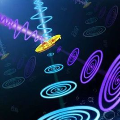Quantum approximate optimization algorithm (QAOA) has shown promise in solving combinatorial optimization problems by providing quantum speedup on near-term gate-based quantum computing systems. However, QAOA faces challenges for high-dimensional problems due to the large number of qubits required and the complexity of deep circuits, limiting its scalability for real-world applications. In this study, we present a distributed QAOA (DQAOA), which leverages distributed computing strategies to decompose a large computational workload into smaller tasks that require fewer qubits and shallower circuits than necessitated to solve the original problem. These sub-problems are processed using a combination of high-performance and quantum computing resources. The global solution is iteratively updated by aggregating sub-solutions, allowing convergence toward the optimal solution. We demonstrate that DQAOA can handle considerably large-scale optimization problems (e.g., 1,000-bit problem) achieving a high approximation ratio ($\sim$99%) and short time-to-solution ($\sim$276 s), outperforming existing strategies. Furthermore, we realize DQAOA on a quantum-centric supercomputing architecture, paving the way for practical applications of gate-based quantum computers in real-world optimization tasks. To extend DQAOA's applicability to materials science, we further develop an active learning algorithm integrated with our DQAOA (AL-DQAOA), which involves machine learning, DQAOA, and active data production in an iterative loop. We successfully optimize photonic structures using AL-DQAOA, indicating that solving real-world optimization problems using gate-based quantum computing is feasible. We expect the proposed DQAOA to be applicable to a wide range of optimization problems and AL-DQAOA to find broader applications in material design.
翻译:暂无翻译



